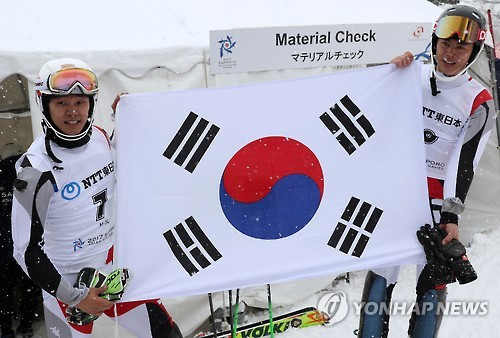South Korean athletes made a triumphant homecoming Monday following their record-setting performances at the Asian Winter Games in Japan.
The main delegation of 72 athletes and officials in cross-country skiing, women‘s hockey and biathlon received a hero’s welcome at Incheon International Airport. Athletes in sports that had concluded before Sunday‘s closing ceremony already returned home last week.
South Korea grabbed 16 gold medals and 50 medals in total to finish in second place in the medal standings behind Japan at the Sapporo Asian Winter Games, which wrapped up Sunday after an eight-day run.
Both the gold medal and the overall medal tallies were South Korea’s records at a single Asian Winter Games. At the 2011 competition in Kazakhstan, South Korea won 13 gold medals and 38 medals in all.
South Korea‘s stated goal in Sapporo was to capture at least 15 gold medals, and it surpassed the target on the penultimate day of the competition, thanks to gold medals by alpine skier Jung Dong-hyun and figure skater Choi Da-bin.

South Korea picked up its first gold medal on the first day of the Asian Games, with alpine snowboarder Lee Sang-ho winning the giant slalom title on Feb. 19. And the country kept on rolling, collecting six gold medals from speed skating and five more from short track.

There were also gold medals in alpine skiing and cross-country skiing, an encouraging development for a nation that has long struggled in snow events.
The athletes’ performances bode well for their prospects at the 2018 Winter Olympics in South Korea‘s PyeongChang. The country sent most of its top winter sports athletes to Sapporo, hoping to see how they would stack up against the regional rivals.
Lee Kee-heung, president of the Korean Sport and Olympic Committee (KSOC), greeted the delegation at the airport, saying the strong Winter Asia ad campaign sets up nicely for the PyeongChang Olympics.
“It’s all due to your dedication and hard work that you were able to accomplish so much in Sapporo,” Lee told the athletes. “And the KSOC will spare no effort to create perfect training environments for you.”
Kim Sang-hang, South Korea‘s chef de mission, said the athletes were able to accomplish their goal “all thanks to the support of our people.
Cross-country skier Kim Magnus, who captured three medals, including a gold in the 1.4km individual sprint classic, said his successful Asian Games gave his confidence a major boost.
”I don’t necessarily think I‘ve gotten closer to an Olympic medal after the Asian Games, but it’s all part of the process,“ said Kim, born to a Norwegian father and a Korean mother, ”It was an unbelievable feeling to accomplish something I‘d wanted to for a long time. And gaining confidence was huge.“

Kim’s gold medal came early in the Asian Games. And figure skater Choi Da-bin emerged as a star later in the competition, as she won the women‘s singles gold medal on Saturday, a day before the closing ceremony.
Choi, 17, became the first South Korean figure skater to win an Asian Games gold. She was a last-minute injury replacement for Park So-youn, and Choi said she exceeded her own expectations in Sapporo.
Choi set new personal-high scores in free skate (126.24) and total points (187.54) en route to the gold.

Choi will next compete at the world championships in Finland starting on March 29, with the 2018 Olympic spots at stake. Choi will once again be an injury replacement there after Kim Na-hyun withdrew with an ankle injury.
”I’ll try to maintain my form until the world championships,“ Choi said. ”It‘s going to be an important event.“
If Choi finishes in the top two at the worlds, South Korea will receive three berths to the Olympics. Skaters finishing between third and 10th place will earn two Olympic berths for their country. Anyone below that will bring home one Olympic ticket.
Choi said she will continue to train in South Korea instead of going overseas.
”If I get hurt while training in a foreign country, I might not get proper treatments and it could make the injury worse,“ she said. ”I plan to stay at home because I’d like to minimize that risk.”

